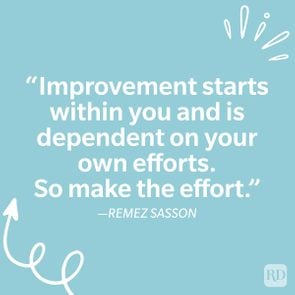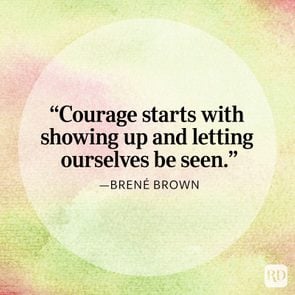How to Stop Self-Criticizing and Build Yourself Up Instead
Updated: Dec. 08, 2023

Negative self-talk isn't self-improvement—it's a form of self-harm. These tips from the experts will help you stop self-criticizing and be more compassionate with yourself.
It won’t hurt as much when you say something mean about me if I say it about myself first. For decades, this had been my mantra, a type of self-defense mechanism I developed as a kid against those who would criticize, bully or belittle me. On one hand, it made me humble, aware of my flaws and open to improving myself. On the other, self-criticizing stunted my ability to be confident and trust my gut.
The self-criticism quickly took on a life of its own—to the point where I was constantly trying to anticipate what people might not like about me and then beat them to the punchline. “I know I can be too much, and you’re probably sick of me,” I’d tell friends, which was a statement born less out of self-awareness and more out of fear. That sort of self-deprecating remark made it impossible to love myself, put others in an awkward position and backfired on quite a few occasions. A new friend once quipped, “If that were true, why would I be friends with you? Are you saying I have bad taste in friends?”
That hit hard. For people who didn’t have good intentions, well, I’d just handed them a laundry list of all my insecurities. What I was really saying was I’m afraid you’ll hurt me, so I’ll hurt myself first. That’s a pretty harsh way to live life. Luckily, there’s a path out of the self-criticizing trap. I talked to the experts to find out why we’re so good at putting ourselves down—and how to stop.
Get Reader’s Digest’s Read Up newsletter for more confidence, humor, cleaning, travel, tech and fun facts all week long.
Why do we criticize ourselves so much?
I’m not the only one who made self-criticizing a personality trait. In fact, a lot of women are conditioned to be this way, says Traci Stein, PhD, a psychologist, author and creator of a series of programs to fight critical self-talk and build self-compassion.
“Having negative thoughts about ourselves is human nature. We all want to fit in, be accepted and not be ostracized,” she explains. “We are all under a lot of pressure to measure ourselves according to other people’s evaluations and expectations. So we subconsciously fixate on something to ‘fix’ so we will feel loved and accepted.”
The irony of these thoughts is that while they’re based on a desire to fit in and feel accepted in our community, they often have the opposite result, says Latasha Blackmond, author of Be You, No Filter: How to Love Yourself and Stay #SocialMediaStrong. “Over time, self-criticism does the very thing you’re afraid of: It isolates you by making you very self-centered and, yes, selfish. You’re too busy worrying about yourself to love and help others,” she says.
Ouch.
What is self-criticism and how do you spot it?
Self-criticism is any thought that highlights a flaw or problem you have—or think you have (as Stein points out, critical thoughts are often untrue). These negative thoughts can become ingrained so deeply in your inner voice that they become hard to recognize in the moment.
You can identify these thoughts, she says, because they are often self-defeating and repetitive, leading to feelings of insecurity, confusion, self-doubt, sadness and anger. The connection between self-criticizing thoughts and negative emotions is so strong that many people with chronic depression find that a habit of severe self-criticism is at the core of their mental illness.
Often tell yourself you’re a massive failure? That’s self-criticism. Other examples of self-critical thoughts include:
- I’ll never be good enough. I’ve always failed at everything I try.
- I don’t deserve to be loved.
- I hate myself.
- If only I were richer, thinner, prettier or smarter. Then people would like me.
- I don’t deserve good things, but I deserve all the bad things.
- I’m so annoying. Everyone must hate me.
These are just the tip of the trash iceberg. Self-criticism can cover any area of your life, including your body, relationships, sexual encounters, career, finances, goals, hobbies, family and education—even your life in general, Stein says.
What is the harm in self-criticizing?
On a basic level, being able to recognize our own faults benefits us because it gives us a chance to correct them and improve. But this is different from the type of malignant self-criticizing many people engage in, Blackmond says. “Self-criticism is rarely productive and often impedes growth,” she says. “You start to believe all the bad things you are saying about yourself, which can then turn into a self-fulfilling prophecy. This, in turn, leads to anxiety and depression, creating a vicious cycle of negativity.”
Case in point: You tell yourself you’re too dumb to get the promotion at work, so you don’t even try. When you don’t get the promotion, you tell yourself that proves you were right. You beat yourself up for your “failure,” which reinforces the belief that you are dumb, starting the whole cycle over again.
“People who are very self-critical lack the confidence to make mistakes they can learn from. Fearing they aren’t good enough can lead to struggles at school, work and in general, and can lead someone to avoid any situation that generates more worry and self-doubt,” Stein says, adding that these people are also more likely to end up in toxic or abusive relationships.
Another issue arises when self-criticism framed as self-improvement turns into excessive worrying, Stein says. “So someone might wind up worrying about an awful lot of things, from whether they are ‘good enough’ in some way to excessive worrying about their health, safety or competence—even if there is no objective evidence suggesting they have something to worry about,” she explains. “These worries take up a lot of time and energy.”
How to stop self-criticizing once and for all
The good news about these negative thoughts is they are just that: thoughts. And you can change your thoughts, Blackmond says. It starts by cultivating a positive mindset through self-compassion. “Be aware of the negative thoughts and interrupt that internal dialogue,” she says. “Change them into something positive. Speak to yourself kindly, like you would to someone you love and care about. You’d never tell your child that they are stupid and ugly, so don’t speak to yourself that way either.”
Easier said than done? Here are 12 tips from our experts that will help you cultivate self-compassion and nix harmful critical thoughts.
Celebrate imperfections
Kintsugi is a Japanese art form that repairs broken pottery with gold, highlighting the “flaws” and showing the beauty in breaking down and repairing. Look for kintsugi in your life, metaphorically and physically. “Look to art, music, poetry and prose, drama and [other areas] that celebrate imperfection and see it as a gift, not a flaw to be hidden,” Blackmond says.
Try this: Start by reading body-positivity quotes and confidence quotes. For a hands-on lesson in the beauty of imperfections, get a kintsugi craft kit. Or watch a play, read a book or listen to a song that celebrates our flaws.
Be less judgmental of others
People who are harshly critical of others are usually harshly critical of themselves as well, so learning to offer others grace and compassion can open the door to doing the same for yourself, Blackmond says. “It’s about not seeing the world as black or white, good or bad,” she says.
Try this: Whenever you catch yourself thinking negatively of someone else—from your sister to a celebrity to a terrible driver—stop the thought and offer a more compassionate take. Let’s say your mind automatically thinks What kind of idiot can’t park between the lines? Replace the thought with a kinder take: This person must have been in a big hurry or having a bad day. I hope things get better for them.
Delete your social media apps

Or at least lessen the amount of time you spend on them. “Social media can have this immense impact on our self-esteem because it encourages us to compare our worst selves to other people’s best selves,” Blackmond says. Besides, what you see is often photoshopped or cherry-picked.
Try this: Stop comparing yourself to others. Limit your time on social media to one hour or less per day. Curate your feed, and unfollow anyone who makes you feel bad about yourself.
Get therapy
Self-critical thoughts can be really sticky, especially if you’ve made a habit of them, Stein says. “A good therapist will help you learn to recognize these thoughts, challenge them and come up with anxiety-management strategies,” she says. “They can also act as a mirror, helping you see yourself in a more accurate light.”
Try this: Find a therapist who specializes in self-compassion or read a book about self-compassion.
Do a mindfulness meditation
Mindfulness is simply the practice of being present in the here and now, and when you’re focused on this moment, you can’t beat yourself up by looking to the past with regret or looking to the future with worry, Stein says. “Mindfulness meditation is a powerful tool for learning to reframe or stop self-critical thoughts,” she says.
Try this: Download a meditation app like Calm, Headspace or The Mindfulness App, and do a daily guided mindfulness meditation. Don’t worry about acing the practice on day one. Being mindful is a learned skill, and mindfulness meditation is useful even at the beginner stage.
Use self-deprecating humor sparingly
Making other people the butt of your jokes is cruel … and so is making yourself the butt of the joke. “A little self-deprecating humor in the right situation can help defuse tension and build relationships, but a little goes a long way,” Blackmond says. Heavy-handed self-deprecating humor makes others uncomfortable, and it can affect how you see yourself.
“Be very careful with how you speak about yourself, even in a joking way,” she says. “Better yet, pick a different type of humor to bond over.”
Try this: Brush up on your public speaking, and if you’re going to crack a joke, pick one that has nothing to do with you.
Go outside
Self-criticism makes your world get smaller and smaller as you limit yourself. The antidote? Make your world bigger. “When you find yourself getting trapped in a cycle of negativity, go outside and take a walk,” Blackmond says. Breathe the fresh air, look at the sunset, say hi to your neighbors, pick up a little trash along the way—all these things will help you instantly feel better about yourself and the world.
Try this: Take a walk outdoors each day and boost both your mental and physical health. Listen to some confidence-boosting songs in the process to really break your negative mindset.
Learn a new hobby

From painting to computer coding to rock climbing, trying new things helps you focus on the positive while “proving” the negative thoughts wrong. The trick, Blackmond says, is to go into it with a positive attitude. Be open to new things and accept that failing is a part of the learning process. “It’s OK to fail,” she says. “Expect mistakes as part of the learning process—celebrate them.”
Try this: Sign up for a class, find a new hobby or go back to an activity you used to love.
End toxic relationships
“A lot of us are self-critical because we were criticized early on by parents or other loved ones,” Stein says, adding that people often see this type of criticism as good because it’s “done out of love.” But this is not loving behavior.
“Go where you’re celebrated,” Blackmond says. “Everyone deserves to be celebrated and lifted up by their loved ones.”
Try this: Break the cycle by keeping relationships with only those people who build you up and encourage you to grow. Avoid people who use “brutal honesty” or “tough love” to show their care. Stand up for yourself and kick those toxic relationships to the curb.
Try cognitive behavioral therapy
Cognitive behavioral therapy (CBT) and its companion, dialectical behavioral therapy (DBT), are powerful psychological tools for reframing negative thoughts and learning how to think more positively, Stein says. “CBT helps people become more aware of the specific, core beliefs behind all of these in-the-moment worries and identify what is triggering the negative self-talk,” she explains. They sound technical, but the concepts are simple, and anyone can implement them with practice.
Try this: Even if you have to get out of your comfort zone a little, it’s worth signing up for a course of CBT. Not ready for that? Do a CBT workbook at home.
Help other people
The fastest way to feel more positively about yourself is to do something positive in the world, Blackmond says. “Self-criticism is inherently selfish. Serving others is selfless,” she says. “Pure altruism sparks a cascade of love and positivity that fills you and radiates outward.”
Try this: Do something for someone who can’t do anything for you, she suggests. For instance, volunteer at a local school or food bank. Not only will you be doing some good in the world, but you’ll reap the many benefits of volunteering.
Use self-reflection instead of self-criticism
No one is saying that you need to think you’re perfect exactly the way you are, or there’s no room for improvement. Rather, Blackmond says, you should be looking honestly and realistically at your flaws. The trick is to do it in a positive way. Self-reflection encourages insight and action based on self-love and a desire to do better and be better, she explains. Self-criticism stops that process, trapping you in a cycle of negativity and stunting your growth.
Try this: Keep a journal of the things you like about yourself and the things you can improve on. Practice gratitude for yourself and others. Make positive goals to help you progress in those areas, track your progress and celebrate your successes.
Stop the self-criticizing cycle
“At the core of every self-critical belief is the question ‘Am I lovable and worthy of love the way I am?’ And the answer is yes, you are,” Stein says. Too many people, like me, use self-criticism as a self-defense tool, and it cuts us off from the very love and acceptance we crave.
Learning how to build emotional strength and quiet that critical self-talk through self-compassion is the key to stronger relationships and a happier life. “You’ve only got this one life, so don’t waste it on regret and worry,” she says.
About the experts
- Latasha Blackmond is an expert in self-love and the author of Be You, No Filter: How to Love Yourself and Stay #SocialMediaStrong. She is a highly regarded consultant, strategist and speaker with 14 years of experience in communications, law and social media best practices.
- Traci Stein, PhD, MPH, is a Columbia University–trained psychologist, certified clinical hypnotherapist and award-winning author. She is the creator of a series of popular guided imagery, self-hypnosis and meditation audio programs on self-compassion.



